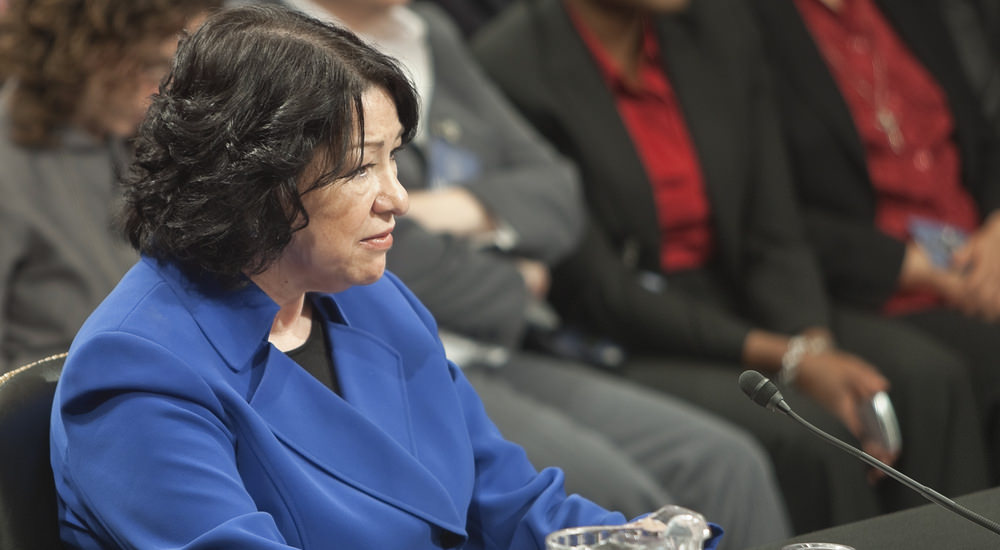By Wes Walker,
You’d almost have to be blind not to notice the full-court press in the campaign to discredit GOP-nominated members of the Supreme Court.
Oppo research has dug up stories about friends, relations, and travel — insinuating that these Justices have been somehow ‘on the take’ when, on closer inspection, there is no evidence of rulings being influenced, of improper gifts, or even any indication that the instances cited are equal to or less than similar gifts afforded to their Democrat-nominated counterparts.
The breathless accusations about Clarence Thomas’s family home leave out the part where developers saved the home from demolition to make it into a museum. Even the complaint that his mother was living there ‘for free’ ignores that his mom living out her natural life in her family home was one of the negotiated terms of the sale.
Wave after wave of critical stories come out as if to confirm everything Justice Thomas once said in his confirmation hearings about ‘high-tech lynchings.’ The attention is always laser-focused on what they can dig up about the conservative judges.
Critics on the right are nearly unanimous in their condemnation of this tactic as a naked attempt to discredit some judges, so they can ‘fix’ the ‘problem,’ so they can control the one branch of government that is an impediment to their agenda.
Even the staunchest defenders of the conservative justices — like Ted Cruz — couched their defenses of SCOTUS in the framing that they were NOT accusing current justices of wrongdoing, only using unobjectionable norms of Justices on the left as a reference point to more correctly understand those of Justice Thomas and others.
Nobody paid much attention to conflicts of interest or financial reporting issues in the judiciary until this issue was raised. But once muck-rakers began looking into conservative judges, it was only a matter of time before their defenders sought counter-examples.
Once you begin looking under every rock, you never know what might turn up.
Unfortunately for Justice Sotomayor, what turned up was an instance where she didn’t recuse herself from a ruling in which the company she receives her primary income from stood to be impacted financially by her ruling. In the same case, Justice Breyer, financially connected to the same company, DID recuse himself from making a decision.
In 2010 and 2012, Sotomayor received three book advance payments from a publisher totaling roughly $3.1M. More residuals were set to follow. Did the money she received influence a decision before her that would have directly affected the financial status of Penguin Random House?
Daily Wire explains what was at issue:
In 2013, Sotomayor voted in a decision for whether the court should hear a case against the publisher called Aaron Greenspan v. Random House, despite then-fellow Justice Stephen Breyer recusing after also receiving money from the publisher. Greenspan was a Harvard classmate of Mark Zuckerberg’s who wrote a book about the founding of Facebook and contended that Random House rejected his book proposal and then awarded a deal to another author who copied his book and eventually turned it into the movie The Social Network.
In 2017, Sotomayor began receiving payments each year from Penguin Random House itself, which continued annually through at least 2021, the most recent disclosure available, and totaled more than $500,000. In all, she received $3.6 million from Penguin Random House or its subsidiaries, according to a Daily Wire tally of financial disclosures.
In October 2019, children’s author Jennie Nicassio petitioned the Supreme Court to hear her lawsuit against Penguin Random House alleging that the book publisher had copied her book by selling one that was nearly identical. On the same day that the petition was distributed to the justices, Sotomayor received a $10,586 check from the publisher.
On February 24, 2020, the Supreme Court voted not to hear the case, denying the “writ of certiorari” and meaning that the case would remain where it left off — with a circuit court having found in the publisher’s favor. Sotomayor’s next check, coming in May of that year, was her largest ever from the parent company, at $82,807.
Should she have recused? Did her private financial connections influence a decision against a petitioner before the court? Was the question decided rightly? We don’t know.
But by the standards set by the endless, cynical anti-Thomas smears, the APPEARANCE of corruption is enough to ruin someone’s reputation.
Will the activists see how this tactic has been hurting their own cause, or are they so hellbent on destroying Thomas and the Trump nominees and hijacking the institution that the ruination of the personal reputation of the three Democrat appointees to SCOTUS is an acceptable degree of collateral damage?
Cross-Posted With Clash Daily




